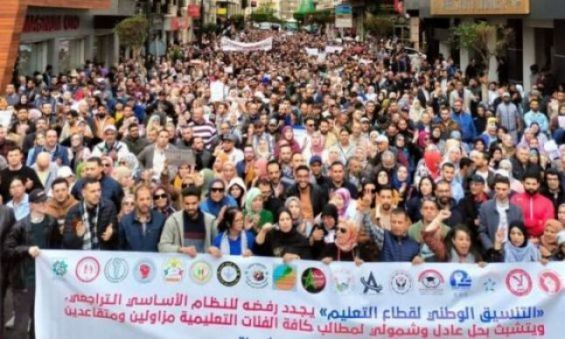The ongoing crisis in the education sector has seen unions failing to unify the actions and voice the demands of the sector’s employees, especially contractual teachers who are subjected to the new statutory system, that have formed around twenty coordination committees.
In fact, many of the most represented education system unions «have rejoiced» over the enactment of the statutory system for sector employees when it first came out. Protests organized by teachers have pushed these unions to review their position and demand the amendment of the reform issued by the government.
In later November, major unions met with a tripartite ministerial committee, to discuss freezing the new statutory system, suspending its implementation and refraining from publishing its implementing decrees before the end of the dialogue over the matter, expected to conclude on January 15, 2024.
On December 6, it was agreed to devote a meeting to the study of all proposals related to improving the income of the sector’s employees, planned to come into force starting next year.
For its part, the National Coordination Committee of the Education Sector, which is comprised of more than twenty bodies, published a press release in which it affirmed its «categorical rejection» of the results of «any dialogue which does not respond to the demands of the men and women of the education sector, including the dialogue of November 30, 2023».
In its written statement, the Committee even emphasized that it was not concerned by this negotiation process. Thus, it called for a four-day nationwide strike this week, from Tuesday to Friday, alongside protest marches.
On the government side, negotiations favor the most represented unions, insisting on the fact that these bodies constitute the main interlocutors in social dialogue. In this case, tensions could continue, extending the current education sector crisis.
«Union action is monopolized»
«The management of the dialogue between the government and the education sector unions on the new statutory system and the fact it got rejected by the coordination committees confirm that teachers are not happy with unionists and their management of the crisis», political science lecturer Rachid Lazraq told Yabiladi.
«This raises eyebrows regarding the credibility of education system unions and whether they really represent the majority of the sector’s employees. It is important to signal that union action has become monopolized by union workers and influenced by political bodies on matters of great importance. The inability of unions to evolve and keep up with the current digital revolution questions their credibility. These coordination committees were able to supervise the teachers' movement, something the unions were unable to project in front of the government. Some of them ended up with the parties of the government coalition, and this is what made a large number of teachers discover that the union was part of an accommodating partisan dynamic, at the expense of the teaching profession, instead of truly defending the interests of several committees during the dialogue with the government. The unions were unable to control the rejection voiced by teachers, which forced them to backtrack under the pressure of coordination committees that preferred escalation».
The researcher added that there was «a real crisis in union action, raising the question of the capacity of union action in its current form to fulfill its role with the massive emergence of coordination committees». According to him, «this tension affects social peace and raises doubts among Moroccan and foreign investors about the socio-professional climate in the country, in light of the wave of demands and the obligation of institutions to increase salaries and bonuses, regardless of the overall financial situation».
«The number of coordination committees has reached 22, while four union representations were unable to integrate them», he added. Consequently, «the next negotiations will show to what extent coordination committees are involved in the dialogue alongside the four unions».
History repeats itself
Furthermore, academic and political analyst Mohamed El Amrani Boukhobza believes that history is repeating itself with unions, like what happened previously with political parties. According to him, a certain preconceived idea has in fact been adopted against political parties for a long period, due to subjective and objective considerations, given the decline of their role in public life, particularly when it comes to representation within institutions. «We are talking about political parties that produce weak institutions», he told Yabiladi.
«We are currently seeing the same thing happen with trade unions, with a fierce campaign against them. The bodies that will emerge from these unions will therefore be weak, knowing that unions are represented within a set of elected governance institutions», the analyst explained.
«Unions are important institutions for social dialogue. It is impossible to conduct this dialogue without the unions. We must rally behind them to support and strengthen them, so that they can accomplish their mission», political analyst Boukhobza argued. «Preventing unions from fulfilling their mediation role is a threat to social peace», he warned.





 chargement...
chargement...













